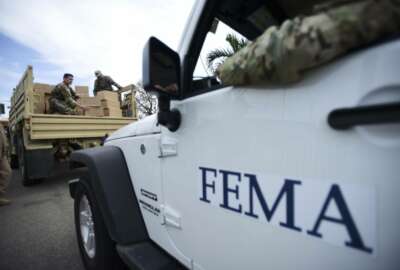
Congressman threatens to subpoena DHS over Kaspersky questions
In today's Federal Newscast, Representative Lamar Smith is not satisfied with the answers he received from the Homeland Security Department on how they are making...
To listen to the Federal Newscast on your phone or mobile device, subscribe on PodcastOne or iTunes.
- Congressman Lamar Smith (R-Texas) is unhappy with the Homeland Security Department’s answers to his questions about how they are ensuring Kaspersky Lab products are out of federal networks. The chairman of the House Science, Space and Technology Committee wrote to DHS threatening to use the committee’s subpoena power after not receiving all the information he requested in December. Specifically, Smith said he wants more details on those agencies that have not submitted reports to DHS about how they will remove Kaspersky products from their networks. He also wanted to know that the agencies that have identified Kaspersky software on their systems, and any details about OMB’s role in ensuring compliance with the directive. (House Science, Space, and Technology Committee)
- The Defense Department began the process of cutting its office of acquisition, technology and logistics in half. Deputy Defense Secretary Patrick Shanahan reassured civilian workers that nothing would change with their titles or grades in the split. It will move the Defense Innovation Unit Experimental and other organizations under the new undersecretary of defense for research and engineering. (Federal News Radio)
- The Army said it’s seen a rash of cases of soldiers having to be hospitalized after vaping oils that turned out to contain toxic substances. In an alert on Thursday, the Army Public Health Center expressed concern that the problem could spread quickly across the Army. Officials said at least 60 troops have gotten medical treatment in recent weeks in North Carolina — 33 more in Utah —with symptoms ranging from serious headaches and nausea, to in at least one case, serious neurological damage. The Army said the vaping products in question are marketed as containing Cannabidiol (CBD), but sometimes also include dangerous or illegal substances. (Army Public Health Center)
- Senator Tim Kaine (D-Va.) said he wants to reduce military spouse unemployment. A new bill would modify federal hiring authority to expedite the hiring of a military spouse. It also instructed the Defense Department to explore ways it can increase the number of child care providers and will require DoD to award contracts to companies that employ military spouses. (Blue Star Families)
- The Trump administration appointed one, and re-appointed another, to financial and national security posts. The president named John Whitely as assistant secretary of the Army for financial management and the comptroller. He is now a senior fellow at the Institute for Defense Analyses. Earlier, Whitely was a health care analyst at the Military Compensation and Retirement Modernization Commission. Bill Evanina is reappointed as director of the National Counterintelligence and Security Center, a job he’s held since 2014.
- Two House lawmakers want more insight into how the government hands out more than 600 billion dollars in grant money each year. Reps. Virginia Foxx (R-N.C.) and Jimmy Gomez (D-Calif.) introduced the Grant Reporting Efficiency and Agreements Transparency, or GREAT Act. It would make federal grant reporting data open and searchable online and would save small businesses hours in filling out duplicative forms. Several organizations, like the DATA Coalition and the Association of Government Accountants, support the bill. Foxx and Gomez first introduced the GREAT Act last September. (Rep. Jimmy Gomez)
- House Minority Whip Steny Hoyer (D-Md.) said a fifth continuing resolution will likely go to the House floor next Tuesday, and he’s confident it’ll pass. But shutdown or not, the federal contracting community will still feel the pain. Members of the Maryland Space Business Roundtable and Goddard Contractors Association said they’ve already lost time, money and talent to four continuing resolutions this year. They said the most recent partial shutdown was especially hard on their young employees, who haven’t earned enough time to take leave with pay. (Federal News Radio)
- Keeping an eye on cybersecurity threats can be tedious work for humans, but federal agencies have found that it’s a good place to experiment with automation. Paul Beckman, Homeland Security’s deputy chief information security officer, estimated that 90 percent of cyber threat monitoring processes could be automated at some point. That will give human operators more time to go after some of DHS’ toughest challenges. One DHS component found more than $300,000 in cost savings less than a year after adopting its automation tools. (Federal News Radio)
- The Veterans Affairs Department has a new approach to deal with low-performing medical centers. VA appointed Peter Almenoff to oversee the department’s Office of Reporting, Analytics, Performance, Improvement and Deployment, or RAPID Healthcare Improvement Center. It’s designed to review clinical indicators to find vulnerabilities and set targets for low-performing medical centers. VA has 15 one-star rated hospitals. VA will review those medical centers once a quarter. Hospitals that fail to make progress may get new leadership. (Department of Veterans Affairs)
Copyright © 2025 Federal News Network. All rights reserved. This website is not intended for users located within the European Economic Area.
Eric White
Eric White is news anchor and Federal Drive producer at Federal News Network.
Follow @FEDERALNEWSCAST
Related Stories

IG: DHS needs better way of making sure suspended contractors actually get suspended
Related Topics
All News
Army Public Health Center
Bill Evanina
Defense Department
Department of Veterans Affairs
Federal Drive
Federal Newscast
GREAT Act
Jimmy Gomez
John Whitely
Kaspersky Lab
Lamar Smith
military spouses
Office of Management and Budget
Patrick Shanahan
Paul Beckman
Peter Almenoff
RAPID Healthcare Improvement Office
Tim Kaine
Virginia Foxx




